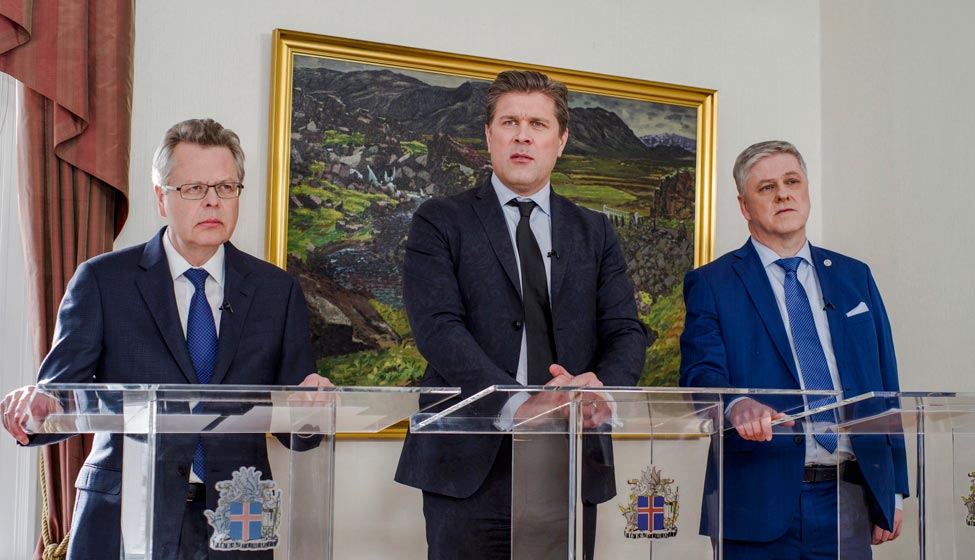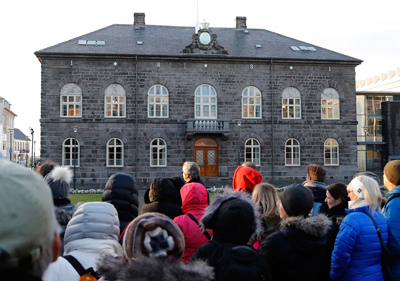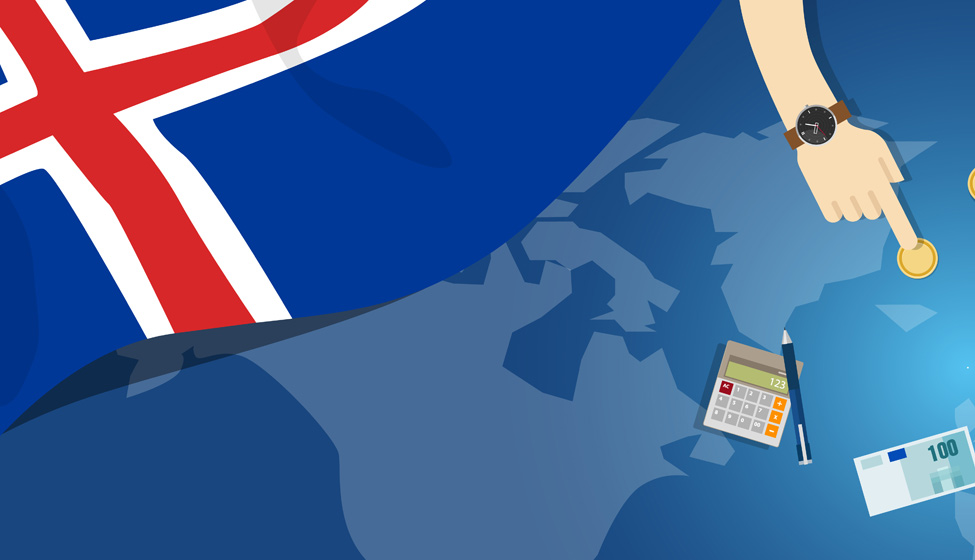Iceland has lifted all capital controls imposed during the peak of financial crisis in 2008. Restrictions on money flowing in and out of the country have been completely removed on Tuesday since the economy showed signs of improvement. The decision would enable its citizens, companies, financial institutions and pension funds to invest in global financial markets.
During the past one year, step by step and calculated easing by the Central Bank of Iceland proved successful in stabilising the economy. “Iceland’s careful, measured approach to lift capital controls was developed and approved with domestic and international support,” said the minister of finance and economic affairs, Benedikt Johannesson.
The International Monetary Fund and economists have admired the efforts of the central bank and the successive governments in handling the crisis so well.
 Iceland's Central Bank governor Mar Gudmundsson (L to R), Prime Minister Bjarni Benediktsson, Finance minister Benedikt Johannesson announces lifting of capital controls with effect from March 14 in Reykjavik, Iceland. March 12, 2017. Photo: Reuters
Iceland's Central Bank governor Mar Gudmundsson (L to R), Prime Minister Bjarni Benediktsson, Finance minister Benedikt Johannesson announces lifting of capital controls with effect from March 14 in Reykjavik, Iceland. March 12, 2017. Photo: Reuters
Uncharted territory
Iceland's economy, built on traditional and stable sectors of fishing, tourism and aluminium smelting, crashed in 2008 after it ventured into financial services. Collapse of a hedge fund based on long-standing businesses led to a rapid economic turmoil.
Three biggest banks—Glitnir, Landsbanki and Kaupthing—that had accumulated assets worth over 14 times the annual GDP of Iceland, collapsed in just three days. The national currency Iceland, krona (ISK), fell in value. The stock market plunged 95 per cent and almost all the businesses went bankrupt. The economy was a complete shambles and the country headed to a huge balance of payment crisis.
Foreign currency loans have been cheaper for Icelanders as the local lenders charged high interest rates on krona debts. When the ISK's value against foreign currency eroded sharply, people who earned in ISK could not pay back in foreign currency. Icelanders were in deep waters as imports too became unaffordable.
After the economy came to a standstill, the IMF came supporting to save the country from falling into dangerous depreciation. The Icelandic government immediately imposed capital control that barred people from purchasing foreign currency or investing in foreign stocks. Icelandic companies had a tough time owing to the restraints on currency outflow. Restrictions prevented foreign investors from moving their wealth out of country. The central bank regulation on funds and high earners ensured plugging of capital outflow that could have worsened the financial crisis.
Foreign creditors and investors suffered huge losses as debtors defaulted. However, the credibility of the government helped to win the confidence of the creditors. They trusted the promise that the restrictions would be lifted when the economy got back to normal.
The economic indicators were too bad—wages dropped by 11 per cent till 2010. The financial system barely survived the crisis period.
 A weak krona brought in a tourism boom creating more employment. Visitors at a stand of Iceland at the International Tourism Trade Fair on March 8, 2017 in Berlin. Photo: AFP
A weak krona brought in a tourism boom creating more employment. Visitors at a stand of Iceland at the International Tourism Trade Fair on March 8, 2017 in Berlin. Photo: AFP
But devaluation of krona soon proved to be a boon. Imports have become rarer as surging export business grew more profitable with competitive pricing in foreign markets. The exchange rates of krona were too tempting for foreign tourists to visit the beautiful north Atlantic island nation. Tourism nearly doubled in 2014 compared to the pre-crisis period. Employment grew faster than ever. In 2016, as many as1.8 million people visited Iceland, a 40 per cent jump from 2015.
Thanks to tourism, household spending and housing market, Iceland's economy grew 7.2 per cent in 2016. The economy was clearly heading for a revival that the central bank decided to call off the restrictions one by one.
Time heals
It took nearly seven years on the road to recovery. During these years, the country built up sufficient foreign exchange reserves that supported strengthening the value of krona. The bank will soon purchase offshore krona dominated assets worth around 90 billion ISK.
 Icelandic parliament the Althing in Reykjavik. Iceland will be the first country in the world to make employers prove they offer equal pay regardless of gender, ethnicity, sexuality or nationality. Photo: AP
Icelandic parliament the Althing in Reykjavik. Iceland will be the first country in the world to make employers prove they offer equal pay regardless of gender, ethnicity, sexuality or nationality. Photo: AP
Icelandic banks were offering 5.25 per cent of interest on deposits. Foreign investors risked depositing in Iceland as many European Union nations were paying only negative interests. The central bank regulations ensured that it was a one-way flow—cash came in without exit.
When traditional industries slowed down for lack of foreign investment, tourism spearheaded growth.
Central policies brought inflation under control and unemployment is down to 3 per cent. Since the economy has stabilised, the key interest rates are set to fall further.
Several economists say the country with 3,32,000 people is too small to be market regulated. Others say that having its own currency and self-managing it helped Iceland. In contrast, Greece, Italy and Spain with euro as their common currency are still struggling.
However, all of them agree that Iceland staged a comeback since people put their trust in the resilience of their economy.





